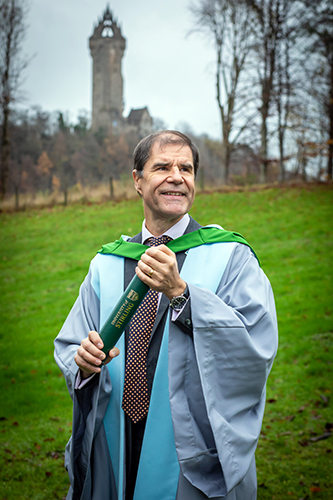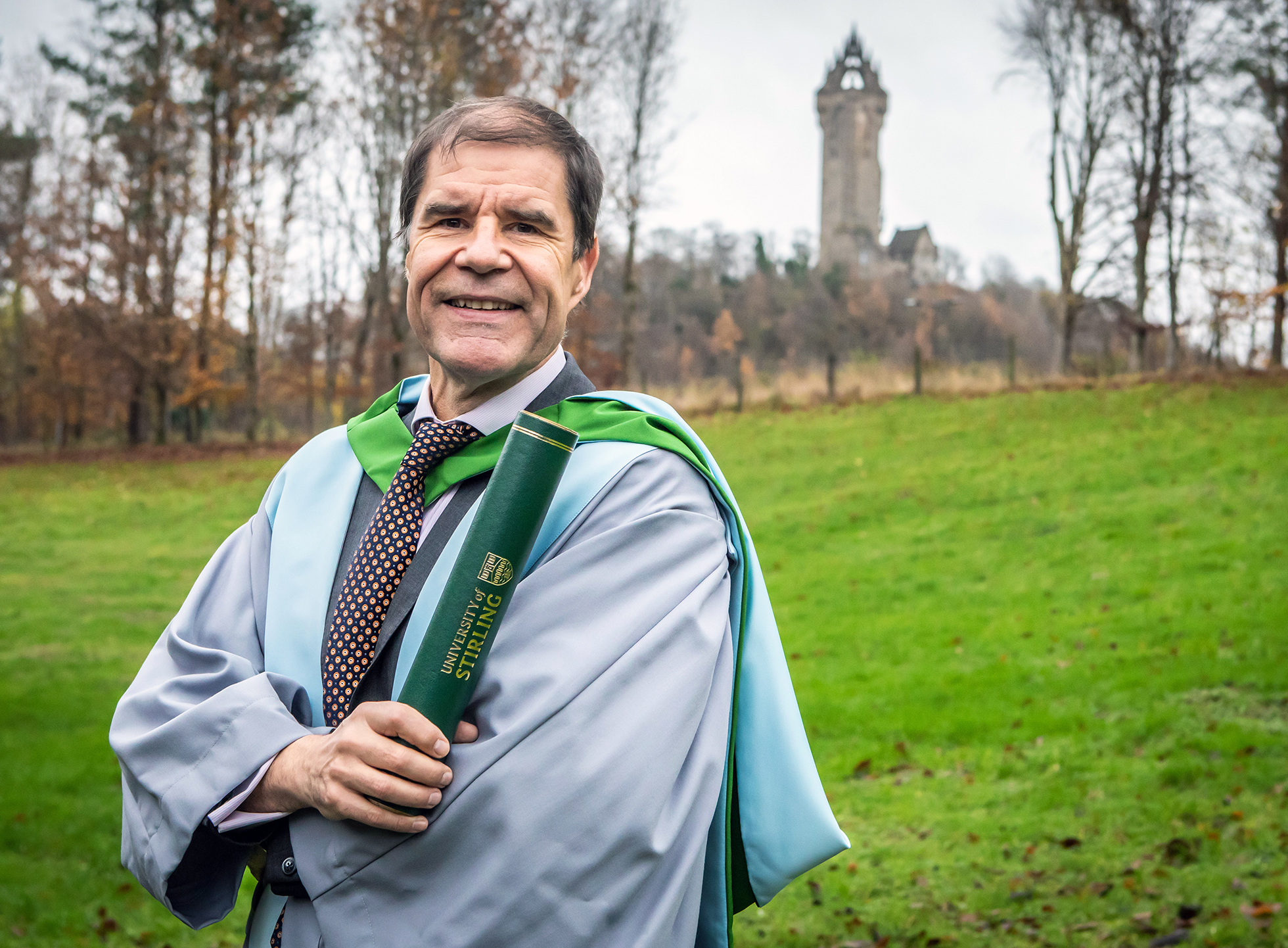Global Footprint Network cofounder Dr. Mathis Wackernagel was recognized for his contributions to sustainability with an honorary degree from the University of Stirling. As part of the commencement ceremony, on November 24th, 2022, he delivered the speech below to the University’s 1,772 graduates and their families.
Chancellor, Principal, members of the University, dear fellow graduates, dear family members of graduates, including their cheerleaders, kind supporters and friends, ladies and gentlemen, and everybody in between.
What a joy and pleasure to celebrate with you today what each of you has achieved. Congratulations. You are awesome. All the clapping warmed my hands… and my heart.
It takes a village to raise a child. And it takes more than a university to graduate a student.
Let’s therefore also take time to thank your parents, your friends, your room mates, your colleagues, your teachers, the food service providers, the random person on campus you had a conversation with, the cleaning professionals, the librarians. Sometimes even grandparents, mentors, advisors. The bus drivers, the IT professionals who kept your internet working, the bakers who get up early for you, the people far away who grew your food, stitched your clothes, probably even your gown. They deserve a big hand as well.
You have worked hard yourself, possibly burned some midnight oil, overcame your doubts, felt alone, struggled, and surely also have had some fun and profound experiences. You may have had some conflicts, and you have found friends.
Definitely, there are plenty more to thank for: the dog or cat that gave you comfort – or maybe a teddy-bear, the music and poets that inspired you, the interesting and unusual people you learned about. Somebody who just listened to you. There are so many.
And sadly, you also had to face COVID which kept you apart, and isolated and deprived of these important social contacts. You also learned how to live through that shock.
All these are opportunities to learn. Certainly, the University of Stirling has changed you, and now you have the skills and opportunities to change the world. What a bargain.
 When I grew up in Switzerland, everything seemed perfect, even the government-produced number signs at every house appeared so carefully crafted. I did not have a sense I was needed. There was nothing I could do to contribute to this perfect world, so it seemed.
When I grew up in Switzerland, everything seemed perfect, even the government-produced number signs at every house appeared so carefully crafted. I did not have a sense I was needed. There was nothing I could do to contribute to this perfect world, so it seemed.
As I finished high-school and entered university, youth felt so stifled in Switzerland, that a youth rebellion erupted. Zurich was on fire. Shops closed every night at 5, and the city stayed dark in the evenings. This was the Swiss version of the Punk movement wondering about the future. It was a reaction to this perfection – to a society which, at that time only supported music of composers solidly dead for at least one 100 years.
The main newspaper of Zurich tried to help people understand this youth rebellion by commissioning a nearly 80-year old philosopher from Geneva and published her long essays. I am not sure she ever visited Zurich.
When studying in Zurich, we got well-prepared lectures from our professors. I studied engineering, but I cannot remember one time the professors would stay around after the lecture to ask us youngsters what may be up with this youth rebellion.
In retrospect, I think, we did not feel heard, seen, or needed.
In contrast, this is what strikes me about the University of Stirling: from the conversations I have had with students and researchers here, from the way the University engages with the larger community, this is a place of learning that fosters engagement. It instills desire for a better world, it equips you with a sense of agency, it cultivates lasting curiosity.
You are entering a difficult world, different from my time of the youth rebellion, one that brings even larger challenges. Parallel to the many marvelous achievements over the last decades, we are also leaving you with difficult legacies.
In the name of my generation, I want to apologize for those. Because we knew about them. 154 countries signed the climate convention in 1992, and yet, by now, we emit about double as many greenhouse gases every year. By now, humanity demands from our planet 75 % more than what our planet can renew. It is like we lived on 1.75 Earths, and yet there is only one. In fact, if we want to give other species (and thereby us) a chance to thrive, ecologists estimate it would be better to use less than half the planet’s capacity. Half Earth is much less than 1.75 Earths.
In these last 30 years, we have not turned around these trends; we do not even know how to, and we have not been fully honest with you acknowledging that we don’t know.
We have given you some skills. And this may not be enough.
Therefore, what I can say to you with clarity today is:
You are needed.
I have been desperately waiting for you.
Your brilliance, innovation, and compassion is not only your greatest asset, I depend on it, and so do all other living beings.
Maybe being needed is not only great. But it gives you meaning, it gives you connection. This is not just a dress rehearsal.
And here one last thought. Because this is something I did not learn at university – in none of the classes. There is an important question with which to start everything – whether you design a policy or develop any new strategy.
This is not a rhetorical question. Neither an overly soft one – remember, I was originally trained as an engineer – nothing soft about that. The question simply is: “do you love people?”
You may not, at every moment, and that’s ok. But every time we develop a policy or a strategy from a hidden sense that we do not like people, we tell people implicitly that the world would be better off without them. These policies will not get anywhere. If on that day your answer is “I do not love people,” it may be time for self-care, it may be time for a warm cup of tea, it may be time for asking yourself “what do I really want?” Because doing things not for the love of people will not produce results.
When I see your sparkly eyes, I feel confidence. I sense possibility, we can build a better world where all can thrive, and we can all thrive without depleting our planet.
I am truly proud of you, you are wonderful. Thank you for being who you are, thank you for supporting each other, thank you for taking on life, thank you for showing up. You truly are needed. Welcome to the next stage of your precious life.



